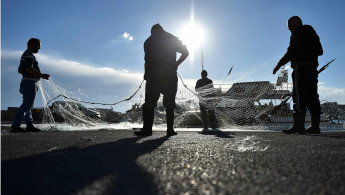Gazan fishermen threaten strike action to protest 'harassment' by Hamas-run naval authorities
Gazan fishermen have on Sunday threatened to suspend fishing in the Mediterranean sea for days until the Hamas-run naval authorities meet their demands.
Zakaria Baker, the official of the fishermen's committees in the Union of Agricultural Work Committees in the Gaza Strip, told The New Arab that the fishermen complained about ongoing "harassment" by the naval police officers.
"Usually, fishermen are being pursued and arrested by the maritime police, as well as they are forced to be committed to limited dates and times for entering, which reduces the fishermen's fishing opportunity," the official said.
He added that such measures hinder the work of fishermen and prevent them from fishing freely and making enough money to help keep them and their families afloat.
Mohammed Salah, a Gaza-based fisherman, was among those who were prevented from entering the sea to fish for days under the pretext that his boat was "small".
"I have been using my boat for more than five years, but the Hamas naval creates new laws and procedures without any regard for the difficult conditions of fishermen," the 42-year-old father of six told The New Arab.
"I used to earn about $10 a day only […] However, I do not have any chance to work in a different profession," he said, adding that "the only thing that we have now is suspending our work for days."
He urged Hamas authorities to ease restrictions imposed on the fishermen and allow them to work freely, as they already suffer from the Israeli blockade.
Some 4,000 Palestinian fishermen live in the besieged Gaza Strip, according to the Fishermen's Syndicate in Gaza. At the same time, approximately 40,000 Gazans work in professions directly or indirectly related to fishing.
Since 2007, the coastal enclave, home to more than two million people, has been put under a tight Israeli blockade after Hamas won the 2006 legislative elections.
In its blockade, Israel banned the entry of several kinds of materials, which it deemed essential for making weapons. Among these were boats, fibreglass, nets, and other fishing materials.





 Follow the Middle East's top stories in English at The New Arab on Google News
Follow the Middle East's top stories in English at The New Arab on Google News


